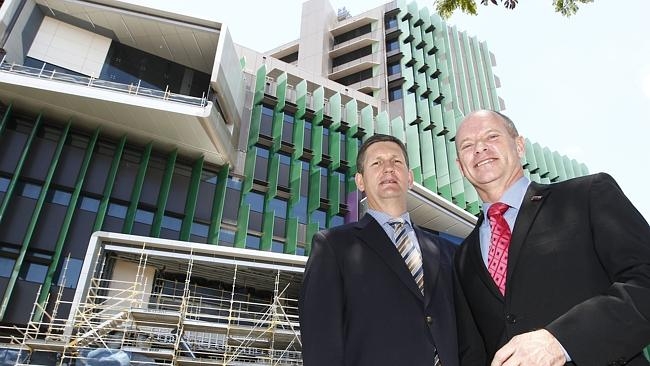
Non-clinical staff at the Royal Children’s Hospital have been told they will not be employed at the new Lady Cilento Children’s Hospital in a move unions claim is an attempt to slash workers’ conditions.
LCCH has signed an outsourcing agreement with Medirest, a subsidiary of British company Compass, to supply most of its non-clinical patient support services.
Queensland Health defended the move and pointed to a $4 million annual cost saving associated with the outsourcing.
More than 100 Queensland Health-employed staff, such as cleaners, those involved in patient food supply and preparation, laundry workers and security guards, will lose their jobs at the RCH when it closes in November to make way for the new facility.
Australian Workers’ Union organiser Steve Baker said the law required RCH staff employed at the new LCCH to have their current pay and conditions maintained, unless they had not worked for Queensland Health for at least three months.
Employees had been told they would not have jobs at Lady Cilento when the new hospital opens, Mr Baker said.
Still, Mr Baker said RCH staff had been encouraged by management to speak to Medirest about possible employment elsewhere in the company.
“I’m suspicious the intention is to employ them elsewhere in the organisation and then move them back to the Lady Cilento hospital once that three-month period is up, which means they will then be able to pick up that skills set from the Royal Children’s Hospital on a much lower rate of pay,” he said.
Mr Baker said typical wages for employees would drop from about $24 to $17 per hour – a cut many would be unable to afford.
“Some of these people have been employed for years on end. I was talking to a guy only the other day who’s been there for about 45 years,” he said.
“It was his first job after leaving school and it’s the only job he’s had in his life and now he’s facing redundancy – with that comes a fair bit of experience, local knowledge and the expertise that goes with that.
“All that will be gone out the window.”
A casual employee, who did not want to be named in fear of losing shifts at the RCH, said morale at the hospital had plummeted since the announcement was made at the end of March.
“They feel very depressed, neglected and invisible because, naturally, the doctors are getting lots of publicity and headlines,” he said.
“All the doctors are fighting about their contracts, while these people have just been told they’re on the scrap heap.”
Children’s Health Queensland hospital and health service chairwoman Susan Johnston said an “exhaustive review” had identified savings of $4 million, which would be reinvested in children’s health.
“To provide context, $4 million is the equivalent of 94 cochlear implants, more than 1300 tonsillectomies or more than 600 appendectomies,” she said in a written statement.
“While this decision affected around 80 permanent employees at the Royal Children’s Hospital, the resulting involuntary job loss figure should be substantially lower.
“Around 30 staff have approached management about our offer to undertake training and reskilling options that might provide them with different job opportunities at LCCH.
“Other staff will also be attractive to south-east Queensland’s five other hospital and health services and could seek redeployment to these facilities.”
Aside from the 80 permanent employees originally identified, the number of casual staff affected brings the total lost job roles to more than 100.
In a written statement to Fairfax Media, Medirest human resources executive director George Mifsud said his company offered “best practices and economies of scale in services and staffing” and repeated Ms Johnston’s claim the savings would be reinvested in children’s health.
“Early indications are that the number of impacted staff will be smaller than anticipated,” he said.
“We are committed to assisting impacted staff identify and apply for roles elsewhere within Medirest and will have a dedicated process in place to do so when their current employment ends.
“Medirest offers a comprehensive and competitive benefits program to ensure we are able to attract and retain high quality employees.”
Source: Brisbane Times
